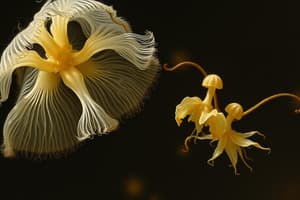Podcast
Questions and Answers
What is the shape and flagella characteristic of Campylobacter jejuni?
What is the shape and flagella characteristic of Campylobacter jejuni?
- Spiral-shaped with multiple flagella
- Cocci with no flagella
- Seagull-shaped rod with a single flagellum (correct)
- Straight rod with two flagella
Which of the following is a major route of transmission for Campylobacter jejuni?
Which of the following is a major route of transmission for Campylobacter jejuni?
- Direct contact with infected individuals
- Contact with contaminated water sources
- Inhalation of contaminated air
- Ingestion of contaminated food, especially poultry (correct)
What is a characteristic clinical finding in Campylobacter jejuni enteritis?
What is a characteristic clinical finding in Campylobacter jejuni enteritis?
- Presence of red blood cells in urine
- Bacterial growth in the bloodstream
- Leucocytes are almost always present in the feces (correct)
- Presence of eosinophils in the feces
What are common symptoms of Campylobacter infection?
What are common symptoms of Campylobacter infection?
Which groups of individuals are at increased risk for severe Campylobacter jejuni infection?
Which groups of individuals are at increased risk for severe Campylobacter jejuni infection?
What laboratory technique is used for direct detection of Campylobacter in liquid fecal samples?
What laboratory technique is used for direct detection of Campylobacter in liquid fecal samples?
What type of medium is specifically used to isolate Campylobacter jejuni from stool specimens?
What type of medium is specifically used to isolate Campylobacter jejuni from stool specimens?
What is the average incubation period for a Campylobacter jejuni infection?
What is the average incubation period for a Campylobacter jejuni infection?
Which of the following statements about Campylobacter enteritis is correct?
Which of the following statements about Campylobacter enteritis is correct?
What type of bacteria is Campylobacter classified as?
What type of bacteria is Campylobacter classified as?
Flashcards
Campylobacter
Campylobacter
A type of bacteria known for causing food poisoning. It's a gram-negative, oxidase-positive, motile, and requires specific conditions to grow.
Campylobacter jejuni
Campylobacter jejuni
A specific species of Campylobacter that often causes food poisoning outbreaks. It's a seagull-shaped rod with one flagellum.
Pathogenesis of Campylobacter jejuni
Pathogenesis of Campylobacter jejuni
The process by which Campylobacter jejuni causes illness. It starts in the gut and can lead to diarrhea due to a disruption in the lining, toxin production, and inflammation.
Symptoms of Campylobacter jejuni infection
Symptoms of Campylobacter jejuni infection
Signup and view all the flashcards
Epidemiology of Campylobacter jejuni infection
Epidemiology of Campylobacter jejuni infection
Signup and view all the flashcards
Incubation period of Campylobacter jejuni infection
Incubation period of Campylobacter jejuni infection
Signup and view all the flashcards
Clinical features of Campylobacter jejuni infection
Clinical features of Campylobacter jejuni infection
Signup and view all the flashcards
Laboratory diagnosis of Campylobacter jejuni infection
Laboratory diagnosis of Campylobacter jejuni infection
Signup and view all the flashcards
Microscopy of Campylobacter jejuni
Microscopy of Campylobacter jejuni
Signup and view all the flashcards
Sample handling for Campylobacter jejuni
Sample handling for Campylobacter jejuni
Signup and view all the flashcards
Study Notes
Campylobacter Species Overview
- Gram-negative, oxidase-positive, motile rods with complex growth requirements
- Campylobacter jejuni is a subtype, appearing as a seagull-shaped rod with a single flagellum
- Isolation often uses Campy plates, a selective medium for stool samples
Campylobacter jejuni Pathogenesis
- Ingestion leads to invasion and damage of the jejunum, ileum, and colon mucosa
- Endotoxins, enterotoxins, and cytotoxins are produced, though their precise role isn't fully understood
- Gastric acid and the immune system (complement) initially inhibit the bacteria
- C. jejuni can penetrate host cells and pass the epithelial layer
- Mesenteric lymph nodes can become inflamed and enlarged in severe infections
Campylobacter jejuni Symptoms
- Common symptoms include watery, bloody diarrhea, malaise, fever, abdominal pain, and cramps
- Illness is usually self-limiting, lasting at least a week
- Symptoms peak in young adults
Epidemiology of C. jejuni Infection
- Risk factors of infection include lack of stomach acid and hypogammaglobulinemia
- Infection severity and incidence are higher in young adults
Clinical Findings and Diagnosis
- Average incubation period is 3-7 days
- Prominent symptoms are abdominal pain and diarrhea, with nausea being common and vomiting less so
- Severe, watery diarrhea is common
- White blood cells (leukocytes) are often found in feces
- Symptoms typically resolve within a few days
- C. jejuni infection is clinically similar to Salmonella or Shigella infections, but abdominal pain tends to be more severe with C. jejuni
- In less developed areas, infection may manifest as milder diarrhea, and asymptomatic colonization is more frequent
Laboratory Diagnosis of C. jejuni
- Refrigerate stool samples immediately for transport to the lab
- Use specialized transport media for rectal swabs
- C. jejuni can be identified directly in liquid stool samples via microscopy (assessing motility and morphology)
- Isolation relies on selective media to suppress other bacteria in the stool sample
- Culture is more often performed than direct microscopy
Treatment of C. jejuni Infection
- Rehydration is crucial
- Erythromycin or quinolones may be used for treatment
Prevention and Control of C. jejuni
- Safe food handling practices to prevent contamination (especially poultry, milk, and water) are key
Studying That Suits You
Use AI to generate personalized quizzes and flashcards to suit your learning preferences.
Description
This quiz covers essential information about Campylobacter species, focusing on Campylobacter jejuni. It explores its characteristics, pathogenesis, symptoms, and epidemiology. Test your knowledge on this significant pathogen and its impact on human health.





